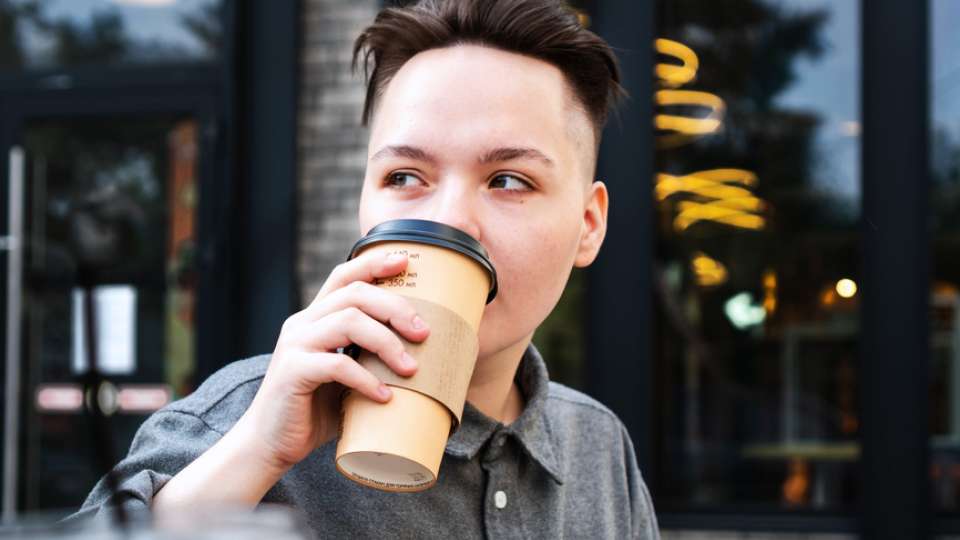
It’s a familiar cycle: drink a cup of coffee or three over the course of a day to stay alert after a bad sleep, then have a glass of wine or whiskey to wind back down before bed. The next morning? More caffeine, please.
Researchers at the University of Washington School of Medicine’s Center for the Study of Health and Risk Behaviors and the University of California, Berkeley’s Center for Human Sleep Science recently looked not just at how alcohol or caffeine affect sleep on their own, but also what their combined effect is on the duration and quality of your Zzzs.
Here’s what they found about what consuming caffeine, alcohol and both in a day can do to your sleep.
How caffeine affects sleep
Caffeine has mostly been found to affect the quantity of your sleep. The stimulant makes it hard to fall asleep, which is why experts recommend avoiding caffeinated beverages after 2 p.m.
The participants in the study reported that caffeine reduced their sleep quantity by 10 minutes per cup consumed the previous day on average, though participants didn’t perceive a decrease in the quality of their shuteye.
How alcohol affects sleep
While alcohol might help you wind you down in the evening, there is ample evidence that it is not good for your sleep. Specifically, it affects the quality of your sleep, including causing more sleep disturbances and less rapid eye movement (REM) sleep.
“We're finding that even with a glass of alcohol, you're seeing a meaningful decrease in sleep quality,” says Frank Song, a researcher in the UW Department of Psychiatry and Behavioral Sciences. His and others’ research has also found a litany of other negative health effects caused by even moderate amounts of alcohol.
In this study, participants’ experiences aligned with this research: Those who’d consumed alcohol the previous day reported a 4% decrease in their subjective sleep quality per drink on average.
How caffeine and alcohol together affect sleep
Things got interesting when Song’s team looked at how the study’s participants responded to the effects of consuming both caffeine and alcohol in a day, which had yet to be looked at in a real-world setting.
“Compared to the nights when you might have one or the other, we thought we were going to see additional decline in subjective sleep quality or sleep duration,” says Song. “But actually, that interaction effect was the opposite of what we expected.”
Instead, the study showed that having both caffeine and alcohol in the same day partially mitigated each other's negative effect on sleep.
What did that look like? When participants consumed caffeine during the day and then had a drink at night, they reported that the alcoholic drink lessened the negative impact of the stimulant on their sleep duration. Then in the morning, having caffeine again made them feel more alert, offsetting the fatigue and lack of alertness from the previous day’s before-bed alcoholic beverage.
Can caffeine wipe out a hangover?
It’s a nice thought that you could just use caffeine to wipe out your hangover, says Song.
But, alas, it’s not that simple. While it might feel like drinking coffee during the day to wake up and alcohol at night to wind down is resulting in better sleep and more alertness the next day, that subjective experience does not actually mean you’re getting good quality sleep.
“What we find is that while there may be greater alertness in the short term, it creates a sleep-state misperception contributing to continued use despite negative effects on sleep,” Song says.
In other words, while it’s been well established in prior research that alcohol causes sleep disturbances and a lack of REM sleep, and that caffeine decreases the duration of sleep, your next-day latte and evening nightcap may make those effects less noticeable. As a result, you’re still suffering from all of the negative impacts of bad sleep, even if you don’t fully realize it.
This disconnect between the perception and actual quality of the sleep you’re getting can lead to some not-so-helpful habits.
“Over time, it turns into a cycle of self-medication, as some may call it, in the real world where people will experience bad sleep as a result of alcohol-induced REM sleep suppression,” Song says. “And they will try to mitigate that with caffeine use in the daytime.”
So don’t be fooled: Just because it feels like a weeknight sip of scotch before bed can offset the 3 p.m. cappuccino you drank to power through the afternoon, it doesn’t mean it’s actually leading to better sleep.
When did participants report getting the best sleep of all? After they abstained from both caffeine and alcohol.
Chris Talbott and Luke Whelan contributed to this article. A version of this story originally appeared on the UW Medicine Newsroom.

 Healthy ideas for your inbox
Healthy ideas for your inbox





